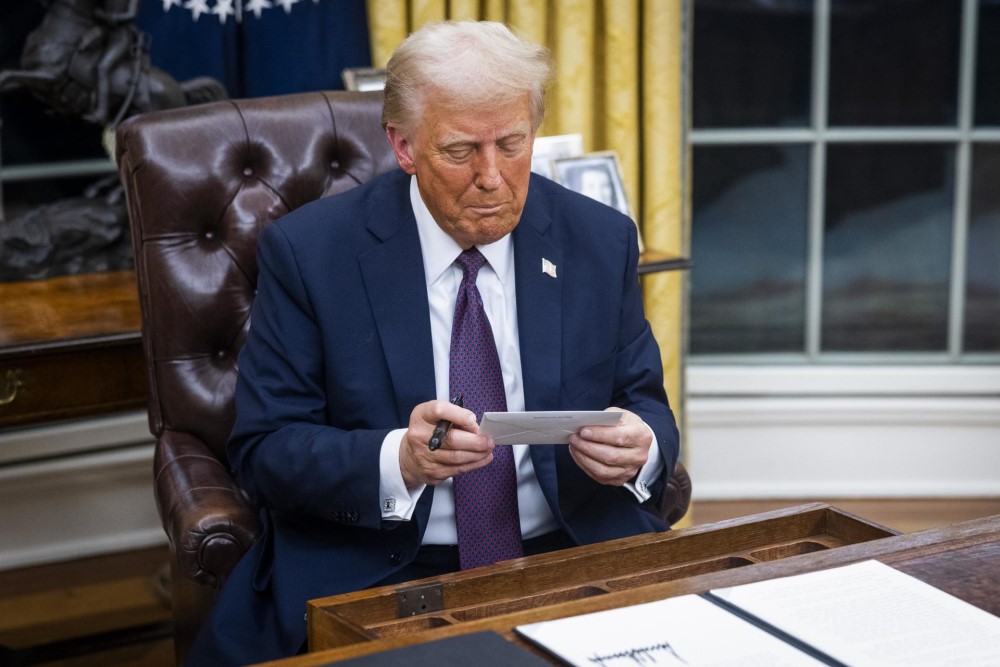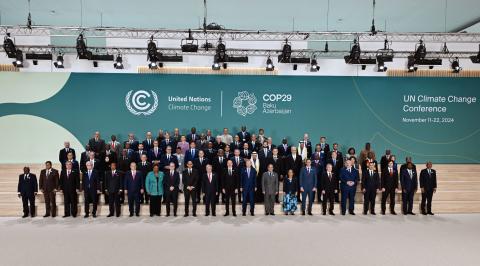Trump signs the US back out of the Paris Agreement
As announced, the new US president, Donald Trump, has signed on his first day in office an executive order for the United States to withdraw from the Paris Agreement. This is the second time Trump has withdrawn his country from the signatory states of the most important climate change agreement, as he did in 2020.

EFE/EPA/JIM LO SCALZO / POOL.
Valladares - Trump (EN)
Fernando Valladares
PhD in Biology, CSIC researcher and associate professor at the Universidad Rey Juan Carlos de Madrid
The new US exit from the Paris Agreement is bad news. It may not have all the terrible consequences that we might think, but in principle it is very discouraging that it happens in the midst of the exponential evolution of extreme weather events that the US itself is suffering both on the west coast with the California fires, and recently the hurricane season, with hurricanes Helen and Milton. This is ample evidence that climate change is a reality that is impacting the US itself. It is a very bad sign that your country is pulling out of an agreement that attempts to mitigate climate change.
It remains to be seen what it will be able to do and what consequences it will have for other countries and for international agreements, such as protocols and climate summits, but it is a blow to the table. It also creates a vicious circle that can be lethal. The vicious circle can be illustrated, for example, with the melting of the Arctic. The Arctic melts, runs out of ice and this allows more oil tankers, more oil tankers favor the short term economy, this short term economy puts more oil tankers in an Arctic that melts for more warming, more oil, less ice, more economy, less planetary health, warming .... A vicious circle in which the last chances of humanity to stay in a climatically safe zone are literally being burned.
Julio Díaz y Cristina - Trump Acuerdo París EN
Julio Díaz
Research professor and co-director of the Reference Unit on Climate Change, Health and the Urban Environment at the Carlos III Health Institute
Cristina Linares
Senior scientist at the Carlos III Health Institute
The United States is currently the second largest emitter of greenhouse gases (11%), after China (30%), but has contributed the most to global warming. Its exit from the Paris Agreement will have an impact on the US's emissions reduction targets, but the advance of renewable energies is unstoppable, although this will be a major setback. It may also serve as a negative example for other countries (China) to be more lax in limiting their emissions.
On the other hand, the Paris Agreement also talks about financing for the countries most affected by the climate crisis, so the exit may also affect the agreements reached at COP29.
In addition, Trump has also signed the withdrawal from the WHO, so it is assumed that the impact of climate change on health is something that does not interest this new administration in the slightest. A decision that comes in the wake of 2024 being the warmest year globally, the recent fires in California, the floods in Valencia and a particularly harsh winter in the USA. All of this with clear implications for morbidity and mortality in both the short and long term, with a significant impact on less analysed factors such as mental health.
A decision that is incomprehensible from a scientific point of view and discouraging for all of us who work in this field.
Alicia Péraz - Trump Acuerdo París EN
Alicia Pérez-Porro
Marine biologist, responsible for policy interaction and institutional relations at the Centre for Ecological Research and Forestry Applications (CREAF) presente in Belém (Brazil)
The Paris Agreement already proved to be much more resilient than we thought in Trump's first term in office. When he said at the time that he was pulling the US out of the Agreement, everyone trembled, but in the end the US stepped back and the EU stepped forward. The world has changed a lot geopolitically since Trump's first term in office. We now know that the step that the EU took will not happen because climate action has taken a back seat in Europe, but we do have other actors, such as China, who may or may not step up their climate action.
I remain optimistic, because of the resilience of the agreement and because, if we focus on the energy transition, it has an undeniable economic component. The markets and the economy are decarbonising and this is an inertia that, regardless of who is in the White House, cannot be stopped. We will continue to invest in renewables and move towards the decarbonisation of the economy. It is very likely that Trump will slow down the process, but I doubt he will be able to reverse it.
Trump's decision must be seen as a political statement to his voters. Before he took office, a number of US businessmen signed a letter asking him not to leave the Agreement because only from the inside could he torpedo it. I believe that, if Trump wanted to derail global climate action, he would have stayed in.
Finally, climate action in the US is going to focus on states and cities. The value of subnational governments is relevant and they must equip themselves with the economic and political tools to deal with situations like this, having Trump as president. State governors and city mayors are already organising to keep their climate goals on the international agenda.
Anna Cabré- Trump Acuerdo de París
Anna Cabré
Climate physicist, oceanographer and research consultant at the University of Pennsylvania
This is bad news because without cooperation and funding from all countries it is difficult to make progress. In this case we are talking about one of the countries that emits the most per capita and has emitted the most throughout history, i.e. the one that should take more responsibility, not less. Moreover, it is a country that is already suffering the effects of climate change, as evidenced by the recent fires in Los Angeles. Even economic experts say that the transition to a low-carbon world is a profitable business opportunity.
For all these reasons, the decision taken is irresponsible. It seems to be acting on the belief that it is not their turn to pay for anything and every man for himself. The only positive thing that could come out of this is that alliances are formed between other, stronger countries without US involvement, and that states, cities and businesses continue to move forward, keeping the process moving forward regardless.



